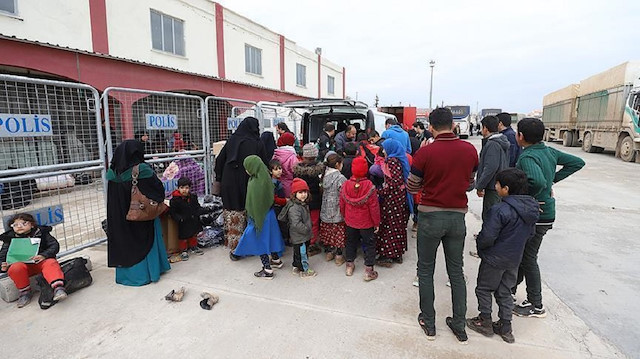
Refugees travel by bus through border crossing in southeastern Turkey to return to their homes in Iraq
Some 400 Iraqi refugees who sought refuge from Daesh terrorists in Iraq by going to neighboring Syria are set to return home with help from Turkey.
The move comes as a result of joint humanitarian diplomatic efforts of the Turkish and Iraqi foreign ministries along with the Istanbul-based Humanitarian Relief Foundation (IHH).
After going through customs, the refugees were taken by bus to a buffer zone near the Oncupinar Border Crossing between Kilis, southeastern Turkey and Syria.
Officials from Iraq’s Consulate and the Kilis migration office examined the refugees, who were provided with winter clothes and shoes by the IHH charity foundation.
The refugees had taken shelter in Syria after fleeing Ramadi, Fallujah, Mosul, Kirkuk and Tel Afar once Daesh terrorists took control of most of these Iraqi cities in 2014.
Iraq's government will continue to stand by its citizens, Qaddo Muhammad Nuri, an Iraqi immigration official, told Anadolu Agency.
He also expressed thanks for the support of Turkey and the IHH’s logistic help in returning the refugees.
Abdullah Altay, coordinator of the IHH's humanitarian diplomacy unit, said the Iraqis’ return was the fruit of negotiations with Iraqi government officials.
These refugee children will have the opportunity for a better life in Iraq, he added.
Mohammad Jasim, an Iraqi refugee from Fallujah, expressed his joy at being able to go back to Iraq.
"During our stay in Syria we always dreamed of going home," Jasim said.
To date, humanitarian diplomatic efforts by Turkey, Iraq, and the IHH have facilitated the return of 7,000 Iraqis from Syria.
The three parties are also in negotiations for the return of another 6,000 Iraqis.
After Daesh terrorists took over one-third of Iraqi territory in 2014, millions were forced to flee mass destruction in regions such as Mosul, Anbar, and Saladin.
Damage and destruction were seen in thousands of settlements as well as at Mosul Airport, Mosul University, most railway stations, and bridges and hospitals in the old city of the northern city of Mosul. There are dozens of mass graves of victims of Daesh in Mosul and Saladin.
The U.S.-led coalition, formed in October 2014 to combat Daesh, provided the Iraqi administration with support, particularly through airstrikes.




